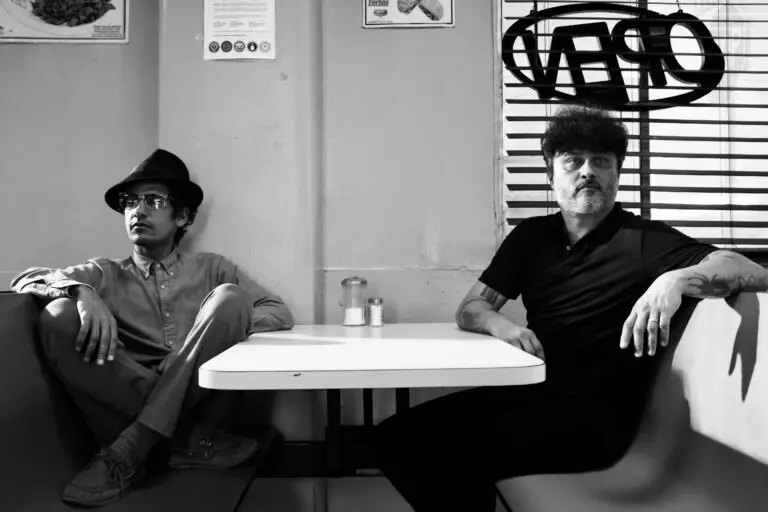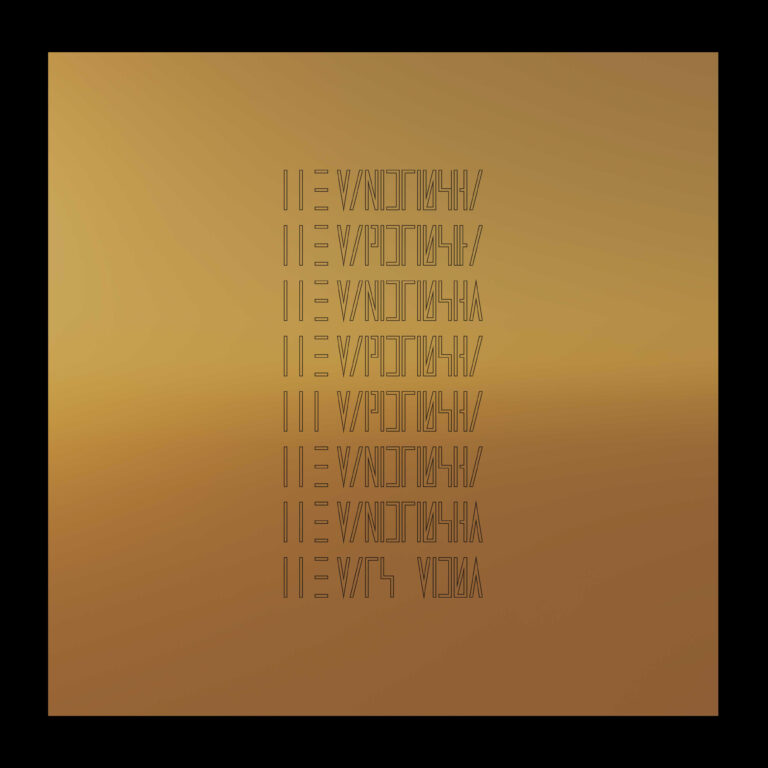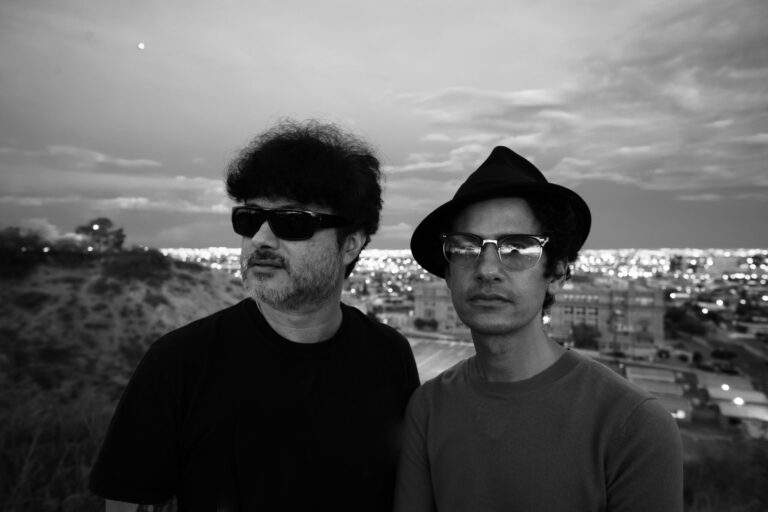On Friday, September 16th, The Mars Volta end their decade-long hiatus and release their self-titled seventh LP. The Mars Volta is the group’s first record under Clouds Hill Records, following the label’s reissue of the band’s back catalog in 2021; a vinyl box set dubbed “La Realidad De Los Sueños” (or “The Reality of Dreams”). This reissue was truly a dream come true to the many fans that have become familiar with The Mars Volta long after their records were available on the shelves.

The set included all 6 previous LPs on 180g black vinyl, along with their 2002 debut EP Tremulant and the original demos from the Deloused In The Comatorium recording sessions called Landscape Tantrums. The demos were an intriguing part of the set, giving fans a look at the raw sound of the band before Rick Rubin put his finishing touches on. Limited to 5,000 copies the box set sold out nearly as fast as it was announced.
Shortly after the release of their sixth LP Noctourniquet in 2012, the El Paso prog rock titans announced that the band was no more. Evolving from a rift in the friendship of band leads Omar Rodríguez-López and Cedric Bixler-Zavala, the feud spilled online and caused the band to announce their break up. The Mars Volta had just completed a European tour behind the new album and Rodríguez-López wanted to move on to new projects while Bixler-Zavala wanted to do a full tour of North America. The feud was short lived however, with Omar and Cedric reconciling after the birth of Bixler-Zavala’s children. The two became creative again, forming the new band Antemasque for a short lived self-titled release and even resurrected At The Drive In for that project’s fourth LP, in*ter*a*lia. All of this activity left fans longing for The Mars Volta, but hope that the band would one day reconvene was as strong as ever.
According to an updated bio, Rodríguez-López began composing fragments of songs that would become The Mars Volta around the time in*ter*a*lia was coming together. The reunion of At The Drive In was cathartic for Rodríguez-López and Cedric Bixler-Zavala’s relationship, albeit short lived. The group left it on good terms after a sizable tour behind the album, but the music of that project left Rodríguez-López feeling trapped in a style that was hard to be creative with. He knew that the time had come to resurrect The Mars Volta for the next chapter and Bixler-Zavala was on board.

Rodríguez-López wanted to make a “heavy pop” record. What could that possibly mean from a band that has alway made spastic and dense psychedelic prog rock with songs stretching well past the 10-minute mark? Ideas of a pop record floated around as early as 2008, but at that time, the band felt the urge to stay true to the frenetic prog rock sound they had pioneered up to that point and could not comprehend what pop sounded like for The Mars Volta.
After going through such a long hiatus from The Mars Volta and attempting to discover new things with old bands and new, Rodríguez-López and Bixler-Zavala knew it was time to evolve The Mars Volta into a brand new era. This meant isolating the musical elements that made The Mars Volta so unique, giving them more space in the mix to breathe, and shortening the songs into cohesive “pop” structures. This also meant giving Bixler-Zavala the freedom to write melodies based off his natural reaction to the instrumentals and treating them to a unique recording process. Rodríguez-López constructed a portable recording studio where Bixler-Zavala’s head was zipped inside of a box to create a level of intimacy to the vocal tracks. The vocals are as sharp and crisp as ever and without the dense layers of noise roaring behind them, we hear Bixler-Zavala in the most detail we ever have.

The “heaviness” also refers to the lyrical content itself. The songs focus on various tragedies and personal loss suffered by Bixler-Zavala. On previous records, Bixler-Zavala would write in deep riddles and invent his own lexicon for certain tracks. On The Mars Volta, the foreign riddles are traded for straight forward, yet poetic and haunting passages that are easier to decipher. “The most revolutionary thing for us to do was just be very simple and straight forward” Bixler-Zavala says about the lyrics. “Palm Full of Crux” was written as an ode to Jeremy Ward, who died shortly after recording Deloused In The Comatorium. “Flash Burns From Flashbacks” and “Collapsable Shoulders” are littered with courtroom and justice metaphors, referring to the impact Danny Masterson’s conduct has had on Bixler-Zavala’s family. It’s the “centrifugal ways” (sung on “Vigil”) always acting in opposition to our intentions that tear us apart – the one constant theme on The Mars Volta.
I think I’m coming undone, he bought the gavel to run all the crooked little cities.
The Mars Volta
The Mars Volta sees the band successfully exploring many different musical genres, and stringing them together in surprising and exciting ways. Bixler-Zavala cites David Bowie specifically as inspiration,“noting that [Bowie] had mastered both challenging, experimental music and the pop format, often on the same song.” The dense overlapping of musical layers of the band’s past works is absent here, in favor of concise song writing focusing on groove and melody while allowing Bixler-Zavala’s vocals to seamlessly glaze over and come through cleanly. A prime example is on the second single, “Graveyard Love” where a sputtering drum beat plays behind a distinct bass line and swirling synths as Bixler-Zavala sings a delicate and haunting melody. Similarly, on “Tourmaline” Bixler-Zavala duets with a sparse acoustic arpeggio before a haunting array of psychedelic guitar and synths drop in, reminiscent of Radiohead’s darkest, jazzy moments.
A dominant presence on the album are funk-rock and Caribbean infused latin-jazz elements. “Qué Dios Te Maldiga Mí Corazón” might be the shortest song in the band’s catalog, but it‘s furious with a driving bongo rhythm and Bixler-Zavala’s Spanish vocal melodies (thinking “L’Via L’Viaquez” here). “The Requisition” and “No Case Gain” fuse funky rhythms, anthemic rock & roll vocals, and groovy guitar riffs that scream early Red Hot Chili Peppers (and even At The Drive In on “No Case Gain”). “Flash Burns From Flashbacks” is another psychedelic mix of guitar and synth arpeggios backed by a punchy and complex drum beat. Much of the drumming from new member Willy Rodriguez Quiñones seems influenced by a combination of Mahavishnu Orchestra and latin-jazz great Steve Berrios.
The album is “heavy” in many ways, but gets the most experimental on the slower ballads. “Palm Full of Crux” is a classic 70s folk/prog sound, floating somewhere between Fleetwood Mac and Led Zeppelin III. “Collapsable Shoulders” again features Bixler-Zavala’s croon, but over a genre-defying slow-paced trap beat while he sings “a truancy of wasps begin trying to make us their home as we pull their wings off one by one.”
All of these varying musical genres and song structures are woven together in a meticulous way that never allows there to be any dead space on the album. When a band like The Mars Volta tune it back the way they do on The Mars Volta, the album can easily become disjointed and drag on in sections. Here, the album goes back and forth consistently between slower ballads and upbeat bangers, constantly peaking the listener’s attention as if on a roller coaster. Album closer “The Requisition” bottles this up in and of itself, kicking off with an uplifting and light keyboard driven ballad before dropping off into an evil Red Hot Chili Peppers style groove.
The menagerie of prog displayed on this album is only pulled off with the incredible production and engineering provided by Johann Scheerer of Clouds Hill Records, in collaboration with Rodríguez-López. While intentional in style, previous Mars Volta records were so dense that many of the layers blended into indiscernible psychedelic arrays. Here, every individual track is given so much space to ring out which somehow amplifies their presence. Every bass note, drum hit, and guitar pluck shine through in extreme detail, and the vocals have a level of depth that we have not heard from Bixler-Zavala before.
The three singles that were chosen to preview the album eclipsed the new direction perfectly. “Blacklight Shine” and “Graveyard Love” came off as different yet familiar, but then “Vigil” solidified the evolution, and shocked fans. The song kicks off with a R&B vocal ballad that swells into a shimmering, 70s era folk rock song with an anthemic chorus one might hear on Rumours or a number of other folk albums from that time period. Towards the end, the song dissolves into a sputtering and complex drum pattern while Bixler-Zavala’s vocal loops dissolve into the background. It is truly a remarkable change of pace for the band, and admittedly, shocking on first listen. The more you listen, the more the subtle elements fill in the perceived empty space, and you really appreciate the complexity they are able to achieve in the subtle instrumentals, while still discussing hauntingly tragic themes Volta fans are accustomed to.
First listen of The Mars Volta is admittedly a jarring, but an incredibly rewarding experience. The suspense that is created on the slower and more deliberate songs culminates into funky grooves, psychedelic arrays, and Latin jazz fusion around every corner. I could not help but to think back to the last time I saw the band live – Roseland Ballroom, 10/8/2009 – almost 13 years to the day the album will be released. I still have the poster from that night hanging in my apartment and will argue it is the best show I have ever seen. But hearing The Mars Volta in 2022, those shows are going to evolve into something even more special and beyond comprehension. The band loves to jam and mix songs live, and we are all on the edge of our seats waiting for our chance to experience it.
The Mars Volta is out on Clouds Hill Records this Friday, September 16th. You can still pre-order the standard and gold foil “Kinetic Editions” on vinyl from the band’s store, and copies of the limited box set La Realidad De Los Sueños have appeared online as well. The tour kicks off in Dallas, TX at The Factory In Deep Ellum on 9/22 and the New York shows happen on 9/29 and 9/30 at Terminal 5 in NYC. Tickets are still available for both nights on AXS.
If the catatonic walls close in on the hem again, pull the tether down for me. I’ve been hemorrhaging the sins of these lesser men.
The Mars Volta
Key Tracks – Tourmaline, EQUUS 3, Flash Burns From Flashbacks


Comments are closed.